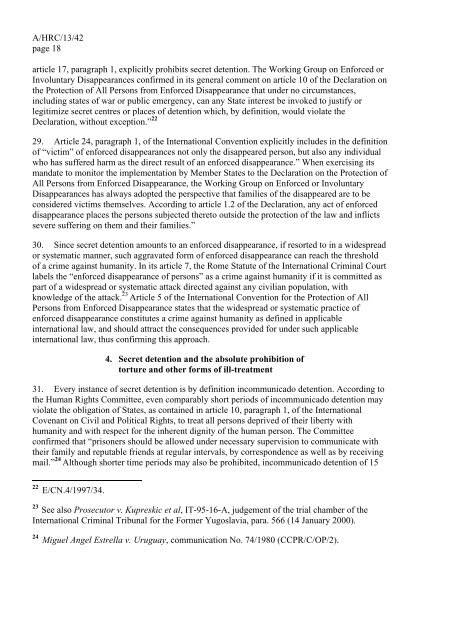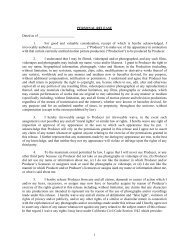A-HRC-13-42
You also want an ePaper? Increase the reach of your titles
YUMPU automatically turns print PDFs into web optimized ePapers that Google loves.
A/<strong>HRC</strong>/<strong>13</strong>/<strong>42</strong><br />
page 18<br />
article 17, paragraph 1, explicitly prohibits secret detention. The Working Group on Enforced or<br />
Involuntary Disappearances confirmed in its general comment on article 10 of the Declaration on<br />
the Protection of All Persons from Enforced Disappearance that under no circumstances,<br />
including states of war or public emergency, can any State interest be invoked to justify or<br />
legitimize secret centres or places of detention which, by definition, would violate the<br />
Declaration, without exception.” 22<br />
29. Article 24, paragraph 1, of the International Convention explicitly includes in the definition<br />
of “victim” of enforced disappearances not only the disappeared person, but also any individual<br />
who has suffered harm as the direct result of an enforced disappearance.” When exercising its<br />
mandate to monitor the implementation by Member States to the Declaration on the Protection of<br />
All Persons from Enforced Disappearance, the Working Group on Enforced or Involuntary<br />
Disappearances has always adopted the perspective that families of the disappeared are to be<br />
considered victims themselves. According to article 1.2 of the Declaration, any act of enforced<br />
disappearance places the persons subjected thereto outside the protection of the law and inflicts<br />
severe suffering on them and their families.”<br />
30. Since secret detention amounts to an enforced disappearance, if resorted to in a widespread<br />
or systematic manner, such aggravated form of enforced disappearance can reach the threshold<br />
of a crime against humanity. In its article 7, the Rome Statute of the International Criminal Court<br />
labels the “enforced disappearance of persons” as a crime against humanity if it is committed as<br />
part of a widespread or systematic attack directed against any civilian population, with<br />
knowledge of the attack. 23 Article 5 of the International Convention for the Protection of All<br />
Persons from Enforced Disappearance states that the widespread or systematic practice of<br />
enforced disappearance constitutes a crime against humanity as defined in applicable<br />
international law, and should attract the consequences provided for under such applicable<br />
international law, thus confirming this approach.<br />
4. Secret detention and the absolute prohibition of<br />
torture and other forms of ill-treatment<br />
31. Every instance of secret detention is by definition incommunicado detention. According to<br />
the Human Rights Committee, even comparably short periods of incommunicado detention may<br />
violate the obligation of States, as contained in article 10, paragraph 1, of the International<br />
Covenant on Civil and Political Rights, to treat all persons deprived of their liberty with<br />
humanity and with respect for the inherent dignity of the human person. The Committee<br />
confirmed that “prisoners should be allowed under necessary supervision to communicate with<br />
their family and reputable friends at regular intervals, by correspondence as well as by receiving<br />
mail.” 24 Although shorter time periods may also be prohibited, incommunicado detention of 15<br />
22<br />
E/CN.4/1997/34.<br />
23<br />
See also Prosecutor v. Kupreskic et al, IT-95-16-A, judgement of the trial chamber of the<br />
International Criminal Tribunal for the Former Yugoslavia, para. 566 (14 January 2000).<br />
24<br />
Miguel Angel Estrella v. Uruguay, communication No. 74/1980 (CCPR/C/OP/2).
















